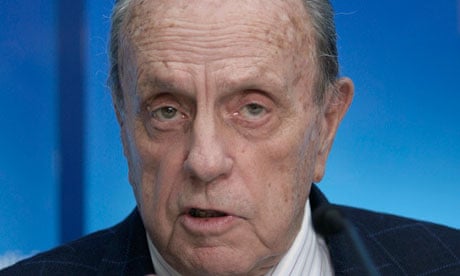The Spanish politician Manuel Fraga, who has died aged 89, was a leading figure and household name for five decades. During that time he went through several chameleon-like and opportunistic changes, while conserving his ultra-catholic, rightwing ideology. A member of the Falange, the sole political party permitted under General Francisco Franco's regime following the civil war of 1936-39, Fraga achieved his first major post as minister of information and tourism (1962-69). Franco charged Fraga with drawing up a new press law (1966), removing pre-censorship of the press. Fraga presided too over the start of the tourist boom, energetically marketing the country under the slogan "Spain is different".
From this period dates his most famous photograph, when Fraga and Angier Biddle Duke, the US ambassador, bathed in the sea at Palomares, Almería, on the southern coast to reassure tourists that there was no danger from radiation – falsely, as it transpired – after a mid-air collision had caused four nuclear bombs to fall near the Mediterranean village. He also, on a hunt, shot Franco's daughter in the buttocks, though this did not appear to affect his relations with the dictator.
In 1969, Fraga was forced out by his Opus Dei opponents within the regime. Out of office, he turned towards building an image as a reformer. He was positioning himself for post-Franco times. As ambassador in London (1973-75), he admired the British Conservative party. Back in Madrid on Franco's death in November 1975, he became home secretary and deputy prime minister in Carlos Arias Navarro's caretaker government.
Now in his prime, Fraga blundered, throwing overboard the years of polishing his reputation as a "reformer' by presiding over months of severe police repression, culminating in the shooting by police of five strikers in Vitoria-Gasteiz in March 1976. "The street is mine," he boasted. It was Adolfo Suárez, not him, who was appointed prime minister in July 1976.
Bypassed, Fraga formed Alianza Popular (AP - the Popular Alliance), whose leaders were known as the Magnificent Seven, since they were seven ex-Franco ministers. The electorate gave its opinion of these nostalgic fascists at the first post-Franco parliamentary elections in 1977: AP got only 16 seats. Nevertheless, AP's entry into parliament allowed Fraga to become one of the drafters of the new democratic constitution and establish his democratic image. From 1979 he took AP towards the centre and this, combined with the disintegration of Suárez's government, meant that AP became, from 1982 on, the principal Conservative opposition to Felipe González's Socialist party. Realising that AP could not break through its ceiling of 25% of the vote while an old Francoist like him was the leader, in 1989 Fraga anointed José María Aznar as his successor. The name of the party changed to the Partido Popular (PP – the People's party).
Born into a peasant family in Vilalba, in rural Galicia, Fraga grew up in a hierarchical, religious atmosphere. At a boarding school in the nearby city of Lugo throughout the civil war, he identified strongly with the Falangist motto, "half monk, half soldier", and considered becoming a priest.
Moving to Madrid at the end of the conflict, Fraga saw postwar poverty. His solution was religious, dedicating time to Catholic relief missions in the city's slums. At the age of 22 he received both his university degree and PhD. In 1945 he came first in the exams to become a state lawyer and in 1947 first in the exams to enter the diplomatic corps. Aged 26, he became professor of political law in Valencia, and then in 1953 in Madrid.
These extraordinary academic achievements won him a reputation as one of Spain's brightest stars. However, the exams at which he shone were based on memory, and his extraordinary capacity in this regard was not matched by great critical intelligence.
His political career began in 1951, with the first of a series of posts in education. His last major appointment was in his native region: in 1990, Fraga, previously a fierce centralist and opponent of Galician national rights, was elected president of the autonomous community of Galicia, a post he held until ill health and the Prestige oil disaster forced him out in 2005. From then until last November he acted as a senator for the PP.
Fraga was a prodigiously hard worker, totally dedicated to political life and the achievement of power.. He also wrote some 80 books, on history, politics and law. Highly cultured and witty, he could still display extreme bad temper.
Differing evaluations of Fraga at his death reflect the deep division in Spanish society. The right exalts him as the statesman who reformed Francoism, co-drafted the 1978 constitution and founded a conservative party that eventually, in 1996, reached power through the ballot box. The left remembers him as an aggressive old fascist, responsible for numerous deaths of oppositionists when minister: unapologetic about his Francoist past ("Franco was one of our best rulers"), hostile to gay people ("Homosexuality is an anomaly") and highly undemocratic in his manipulation of elections as president of Galicia.
In 1948 he married María del Carmen Estévez, who died in 1996. He is survived by their two sons and three daughters.
